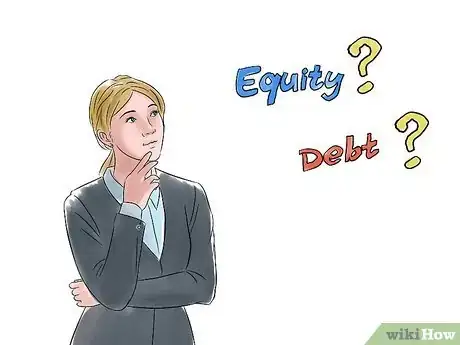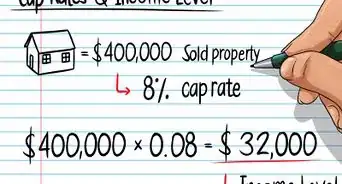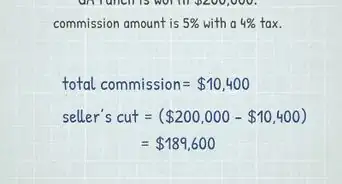wikiHow is a “wiki,” similar to Wikipedia, which means that many of our articles are co-written by multiple authors. To create this article, 21 people, some anonymous, worked to edit and improve it over time.
There are 11 references cited in this article, which can be found at the bottom of the page.
This article has been viewed 179,389 times.
Learn more...
Real estate investment is a complicated field, with a lot of money changing hands. If you'd like to expand your investment portfolio, real estate is a very popular way to do it. This guide will help get your money invested properly.
Steps
Understand the Market
-
1Learn about real estate investing. In order to invest in real estate successfully, you should research the subject thoroughly and be well-versed in how the market functions. There are multiple ways to invest in real estate, and you will need to evaluate your goals and finances to decide which option is best for you.[1]
- Real estate is "an interest in land" (and anything permanently attached to land). This means that the real estate market is essentially about buying and selling land and buildings. There are two types of "interest" at work in real estate: ownership and leasehold. "Ownership interest" is taking full control of and responsibility for land and buildings, and "leasehold interest" is the granting of certain rights to a tenant in exchange for rent payment.[2]
- The most common form of real estate investing is purchasing ownership interest in a property and then earning money from rent paid by tenants.
-
2Identify your tolerance for risk. There are two main markets when dealing in real estate. These are the private and public markets.[3] Any investing is risky to some extent, but each market has its own level of risk.[4]
- Private real estate involves the purchase of an ownership interest in "real" (as opposed to "personal") property. You or a property manager would then operate that property and you would earn money on rent paid by tenants. This is a very direct way of investing in real estate because you, as the owner, are responsible for the property.
- Public real estate involves purchasing shares of a publicly traded real estate company. Often these companies take the form of investment trusts. You buy shares on the market and are paid dividends as the trust collects rent and value from the multiple properties it owns. Because you only own shares in the company, you are not responsible for the real estate. This is a less direct approach to investing.
Advertisement -
3Decide between equity and debt. Both the public and private markets operate on equity and debt. As an investor you pick which of those you would like to invest in.
- If you are investing in debt, you lend money to someone so that they can buy interest in a property. You earn money in the form of interest payments on a mortgage.[5]
- If you are investing in equity, then you are investing in ownership of the property. This means you are assuming all responsibilities for the operation of the land and buildings.[6]
-
4Choose the real estate sector you want to invest in. The four sectors are public equity, public debt, private equity, and private debt.[7]
- If you choose public equity, you will want to look at investment trusts. If you choose public debt, you should investigate mortgage securities, which are the debt equivalent of investment trusts, where various mortgages are bundled together to form a single investment.
- If you select private equity, then you will most likely be purchasing residential or commercial property and acting as a landlord. If you choose private debt, you will invest in private mortgages.
-
5Learn about real estate trading. This is a variation of private equity investing, also known as flipping.[8] The goal is to purchase a property and then turn around and resell it at a higher price.
- These investors try to resell their properties as quickly as possible to minimize their costs of ownership.
- Most flippers will make no improvements to their properties, as they can be expensive and time-consuming. Instead, they bank on the market being favorable to them so that they can resell their unaltered property at a profit.
- A longer-term flip will see the investor improving the property in an effort to increase its value on the market. This form of investment can be labor-intensive and involve significant expenditures. Many such investors will own only one property at a time.
Analyze Your Finances
-
1Examine your portfolio. Investing in real estate is typically viewed as a portfolio enhancer, an investment that complements stocks and bonds. Used as part of a larger investment plan, it can add stability to your income.
-
2Evaluate your assets. Real estate investment can require a significant amount of capital, even beyond the price of the purchase. Ask yourself if you can afford to keep your investment if the market turns bad.
- Since real estate is a tangible property, it will require maintenance and upkeep. While this is normally covered by rent paid by tenants, there may be times when there are no tenants to occupy the property, meaning that the costs will fall to the owner.
-
3Know that flipping a house can get expensive. If you decide to go into real estate trading, you have to be prepared for the worst. In the year that it might take you to renovate and sell, the market could take a dive and you'd be stuck with mortgage payments while you wait for it to sell.[9]
- Make sure that you have the capital to commit to a potentially long-term project.
- Research the ins and outs of house flipping before getting involved so that you minimize unforeseen expenses.
Assemble a Team
-
1Make a plan. Decide where and how you want to invest. Take your plan to an accountant or investment broker. Go over the plan with a financial planner. Make sure that everything is accounted for.[10]
-
2Learn to rely on other people. A good real estate investor will not hesitate to enlist the aid of other professionals in order to ensure that the entire process goes smoothly. The type of team you will need will vary depending on your investment.
- You may need a mortgage broker, an accountant, a property manager, a real estate lawyer, a home inspector, and an insurance broker
-
3Work with a good real estate agent. If you want to invest in real estate, you'll find it invaluable to use an agent experienced in the field of investment properties.
- Find an agent who can help you shop for ideal investment properties. Interview several different agents before choosing one. Discuss your goals and your investment plans. A good agent can show you properties that fit your investment strategy.
-
4Talk to mortgage brokers. Your real estate agent should be able to recommend lenders. Talk to your local banks and credit unions about mortgage financing.[11]
- Find out what the brokers, lenders, and banks can offer in terms of interest rates, closing costs and payment terms. Ask about your financing options and choose the mortgage that best fits your budget and investment strategy.
Community Q&A
-
QuestionIs it possible for someone with a good paying job to own multiple homes and rent them out?
 Community AnswerYes. You can purchase as an individual or as a business entity, which would provide the best protection for your personal assets.
Community AnswerYes. You can purchase as an individual or as a business entity, which would provide the best protection for your personal assets. -
QuestionHow can I start real estate business without much money?
 Community AnswerThere are all sorts of real estate investing. Some do require a lot of money. Others--such as wholesaling (in which a wholesaler puts a property under contract and then sells/assigns the contract)--require very little money. Even when rehabbing a house--typically one of the more expensive ways--there are specialized lenders who (depending on the value of the assets) will lend most of the purchase price and rehab costs. While it's never good to be undercapitalized, it's very possible to get started in real estate investing with little money.
Community AnswerThere are all sorts of real estate investing. Some do require a lot of money. Others--such as wholesaling (in which a wholesaler puts a property under contract and then sells/assigns the contract)--require very little money. Even when rehabbing a house--typically one of the more expensive ways--there are specialized lenders who (depending on the value of the assets) will lend most of the purchase price and rehab costs. While it's never good to be undercapitalized, it's very possible to get started in real estate investing with little money.
References
- ↑ https://fundrise.com/education/blog-posts/how-to-invest-in-real-estate-the-basics
- ↑ https://www.investopedia.com/terms/r/realestate.asp
- ↑ https://www.reit.com/sites/default/files/portals/0/PDF/PublicPrivateRealEstateURDANG07262011.pdf
- ↑ https://gbr.pepperdine.edu/2010/08/private-vs-public-real-estate-markets/
- ↑ https://www.investopedia.com/university/real_estate/real_estate1.asp
- ↑ https://www.investopedia.com/university/real_estate/real_estate1.asp
- ↑ https://www.investopedia.com/university/real_estate/real_estate5.asp
- ↑ https://www.daveramsey.com/blog/how-to-flip-a-house
- ↑ https://www.investopedia.com/articles/mortgages-real-estate/08/house-flip.asp
About This Article
To become a real estate investor, make sure you have enough time and money available to buy and manage a property. Next, choose whether you want to invest in private property and collect rent from tenants, or buy shares in a real estate company, which has less risk but also lower returns. When you are ready to invest, work with a real estate agent and mortgage broker to find a property that suits your needs and your budget. For tips on how to flip a house quickly for a maximum profit, read on!


































































